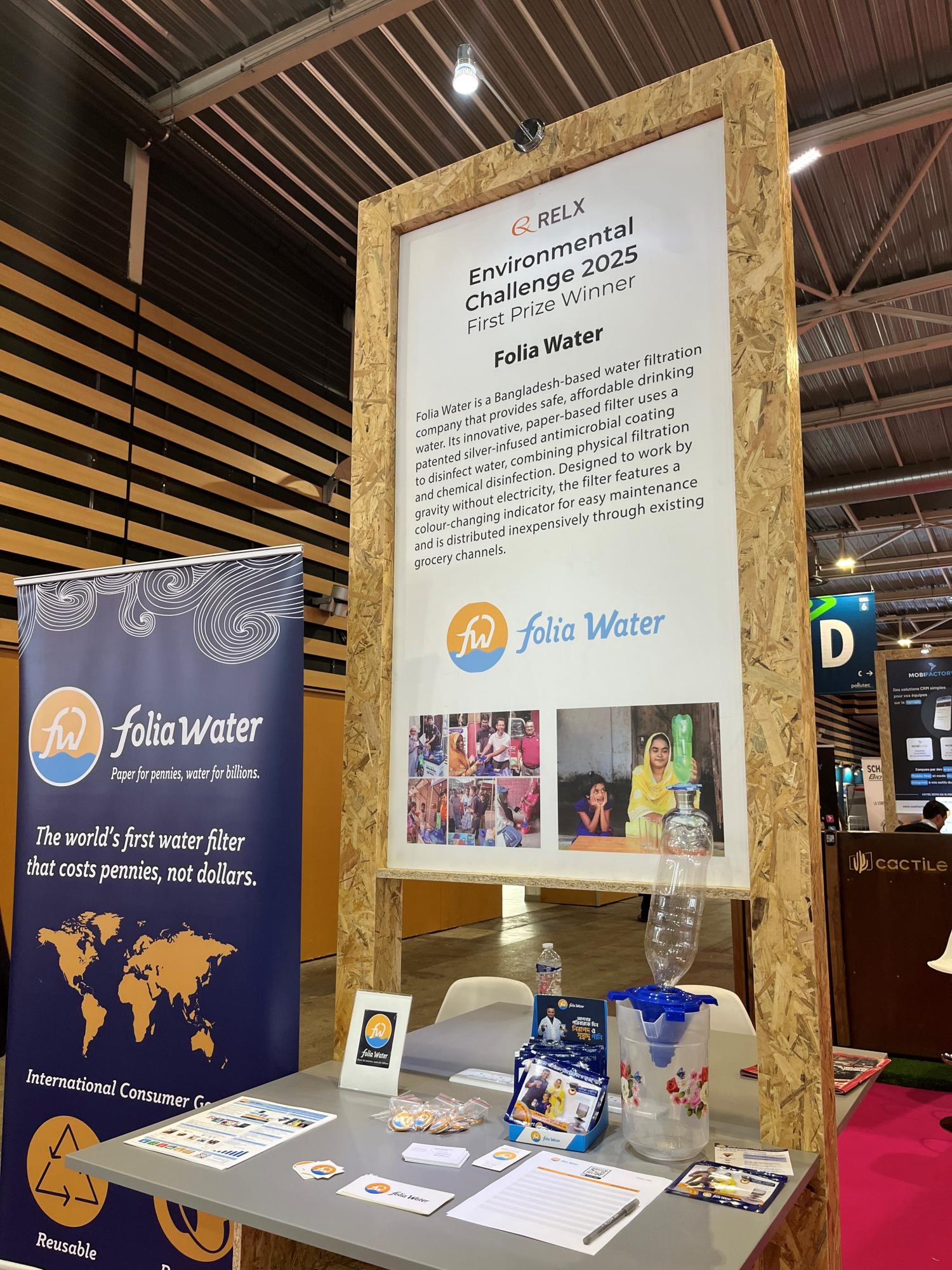
The 2025 winners of the RELX Environmental Challenge, which supports innovative solutions to advance SDG 6 Clean water and sanitation, have been announced.
Since 2011, the RELX Environmental Challenge has been awarded to projects that best demonstrate how they can provide sustainable access to safe water or sanitation. A $50,000 prize is granted to the first place entry and a $25,000 prize for the second place entry. The winners also receive free access for one year to ScienceDirect, RELX’s Scientific, Technical & Medical business’ database of full text, scientific information. Projects must have clear practical applicability, address identified need and advance related issues such as health, education, or human rights. Read more about the RELX Environmental Challenge.
The $50,000 first prize winner is Folia Water Filters, an innovative, paper-based water filter that uses a patented silver-infused antimicrobial coating to provide safe drinking water. The filter, resembling a coffee filter couples physical filtration with chemical disinfection. It is designed to operate by gravity without the need for electricity and to be distributed inexpensively through existing grocery channels, delivering clean water by removing bacteria, protozoa, and viruses effectively.
“Folia Water Global is profoundly honored to receive the $50,000 first prize in the RELX Environmental Challenge. Together with our partner Wellspring Global, this prize enables the market launch of our grocery-priced water filters to Bangladeshi low income consumers, empowering them to provide safe, clean drinking water for their families.”
Jonathan Levine, Ph.D. CEO, Folia Materials
The second prize of $25,000 went to STREED: Solar Thermal Resonant Energy Exchange Desalination, a novel, fully decentralised, membrane-free, solar thermal desalination system designed to address critical water scarcity and brine waste management issues, particularly in off-grid and low-resource communities. Developed over a decade at Rice University, STREED uses resonant energy transfer (RET) to efficiently evaporate and condense water, even from high-salinity and contaminated sources, offering continuous 24-hour operation without external energy storage. Its modular, low-maintenance design targets both small humanitarian applications and larger industrial needs.
“The team is truly honored to receive the second prize of $25,000 from the RELX Environmental Challenge. This recognition validates our decade-long efforts in research and innovation in developing a decentralized, membrane-free desalination solution. We are committed to advancing sustainable water solutions for off-grid communities and industry, tackling water scarcity and brine waste with resilient, low-maintenance technology."
William Scmid, Electrical and Computer Engineering, Rice University
Both winners were invited to attend Pollutec, in France, an RX event and one of the leading international trade exhibitions in environmental and water technologies. Pollutec gathers global experts, industry professionals, and innovative startups in the environmental sector. The winners exhibited in the startup area, where they had the opportunity to showcase their solutions to an engaged audience and network with industry leaders committed to environmental sustainability.
In recognition of a locally developed solution to address the “last-mile” challenge of water carrying, a task predominantly undertaken by women and girls, the judges awarded Antenah Gashaw, inventor of the Anteneh JerryCan, a “highly commended” award. Anteneh JerryCan is a low-cost, replicable water transport solution, specifically engineered for rural and rugged terrains where traditional wheel-aid methods are impractical. Featuring a torus-shaped design that evenly distributes weight, the Anteneh JerryCan alleviates the concentrated load typical of standard jerry cans, minimising spinal pressure and skin friction.
This year’s winners were selected from a shortlist of five projects that were presented to the Challenge’s panel of judges including Dr Mark van Loosdrecht, Professor of Biochemical Engineering, Delft University of Technology and 2018 Stockholm Water Prize Laureate, Dr Lewis Collins, Editor of One Earth, a Cell Press journal publishing research in environmental change and sustainability science and Virginia Gardiner a sanitation expert and inventor and CEO of Loowatt, a waterless toilet system and first prize winner of the 2016 RELX Environmental Challenge.
For enquiries about the RELX Environmental Challenge contact: Mirieme.hill@relx.com
